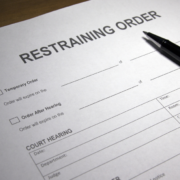You’re scared, and you need to put distance between yourself and your spouse in fear that they will hurt you or your children. You know that filing some type of restraining order can help, but you are unsure about which one is appropriate and how the two differ. The idea of navigating the court system and following all the rules can also feel daunting.
A Protection From Abuse (PFA) order and a no-contact order could both bring you peace of mind. Learn the difference between no contact vs. PFA in Pennsylvania, then seek legal assistance.
What Is a PFA?
A Protection From Abuse (PFA) order is a court order that prohibits an abuser from coming into physical contact with you. This is a type of restraining order and is often used in cases of domestic violence. PFAs last up to three years and are available to individuals 18 or older or teens and children when accompanied by an adult.
When you file for a PFA, a police officer will serve notice to your abuser. They must attend a PFA hearing, where a judge will hear both sides and determine whether to issue the court order. If you are in immediate danger, you can also seek a temporary PFA that would go into effect immediately.
PFA orders prevent the abuser from entering your home, school, and/or place of work. If you live with the abuser, they will need to vacate the home. You will also gain custody or visitation rights of your children during this period.
However, if the defendant fights this restraining order, the judge may not grant it unless you can provide evidence of a physical threat or assault.
PFAs offer victim protection, but they aren’t the only type of protective order in Pennsylvania. Ask your attorney whether a Sexual Violence Protection Order (SVPO) or Protection From Intimidation Order (PFI) may be better.
What Is a No-Contact Order?
A no-contact order is a protective order that prohibits a person from contacting you in person, by phone, or by any other means. The main difference between a no-contact order and a PFA is that a no-contact order can only go into effect after a violent act has occurred, not just after the threat of an action.
No-contact orders go both ways — neither of you can contact each other. This protective order seeks to prevent future crimes. You may seek a no-contact order while waiting for a judge to issue a PFA.
If your abuser violates a no-contact order, they may be found in contempt of court, which can lead to jail time and fines.
Protect Yourself and Your Children With Our Legal Assistance
Do you need help understanding the difference between a no-contact order and a PFA? Are you seeking an appropriate protective order? Karen Ann Ulmer, P.C., is on your side and can help you navigate every step of this legal process. Contact our Pennsylvania attorneys today at (866) 349-4721 to schedule a consultation.





